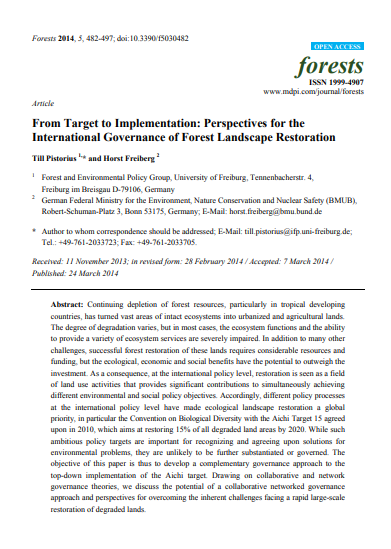Forests (ISSN 1999-4907) is an international and cross-disciplinary scholarly journal of forestry and forest ecology. It publishes research papers, short communications and review papers. There is no restriction on the length of the papers. Our aim is to encourage scientists to publish their experimental and theoretical research in as much detail as possible. Full experimental and/or methodical details must be provided for research articles.
There are, in addition, unique features of this journal:
- computed data or files regarding the full details of the experimental procedure, if unable to be published in a normal way, can be deposited as supplementary material
- we also accept manuscripts communicating to a broader audience with regard to research projects financed with public funds
- manuscripts regarding research proposals and research ideas are welcomed
Members:
Resources
Displaying 211 - 215 of 236Achieving Conservation and Equity amidst Extreme Poverty and Climate Risk: The Makira REDD+ Project in Madagascar
Achieving forest conservation together with poverty alleviation and equity is an unending challenge in the tropics. The Makira REDD+ pilot project located in northeastern Madagascar is a well-suited case to explore this challenge in conditions of extreme poverty and climatic vulnerability. We assessed the potential effect of project siting on the livelihoods of the local population and which households would be the most strongly impacted by conservation measures.
From Public to Private Standards for Tropical Commodities: A Century of Global Discourse on Land Governance on the Forest Frontier
Globalization and commodity exports have a long history in affecting land use changes and land rights on the tropical forest frontier. This paper reviews a century of social and environmental discourse around land issues for four commodities grown in the humid tropics—rubber, cocoa, oil palm and bananas. States have exercised sovereign rights over land and forest resources and the outcomes for deforestation and land rights of existing users have been quite varied depending on local institutional contexts and political economy.
From Target to Implementation: Perspectives for the International Governance of Forest Landscape Restoration
Continuing depletion of forest resources, particularly in tropical developing countries, has turned vast areas of intact ecosystems into urbanized and agricultural lands. The degree of degradation varies, but in most cases, the ecosystem functions and the ability to provide a variety of ecosystem services are severely impaired. In addition to many other challenges, successful forest restoration of these lands requires considerable resources and funding, but the ecological, economic and social benefits have the potential to outweigh the investment.
Multi-Level Policy Dialogues, Processes, and Actions: Challenges and Opportunities for National REDD+ Safeguards Measurement, Reporting, and Verification (MRV)
REDD+ social safeguards have gained increasing attention in numerous forums. This paper reviews the evolution of multi-level policy dialogues, processes, and actions related to REDD+ social safeguards (e.g., Cancun Safeguards 1–5) among policy makers, civil society organizations, and within the media in Brazil, Indonesia and Tanzania, three countries with well advanced REDD+ programs. We find that progress on core aspects of social safeguards is uneven across the three countries. Brazil is by far the most advanced having drafted a REDD+ social safeguards policy.
Tenure Issues in REDD+ Pilot Project Sites in Tanzania
REDD+ has been proposed as a viable option for addressing climate change in the near term, and at relatively low cost. There is a broad consensus that clearly defined tenure rights are important for the implementation and success of REDD+, both to manage forests effectively and to protect local communities’ livelihoods. We use primary data from 23 villages in six REDD+ pilot sites in Tanzania to identify causes of deforestation and forest degradation, and tenure rights issues, at the village level prior to project implementation.






